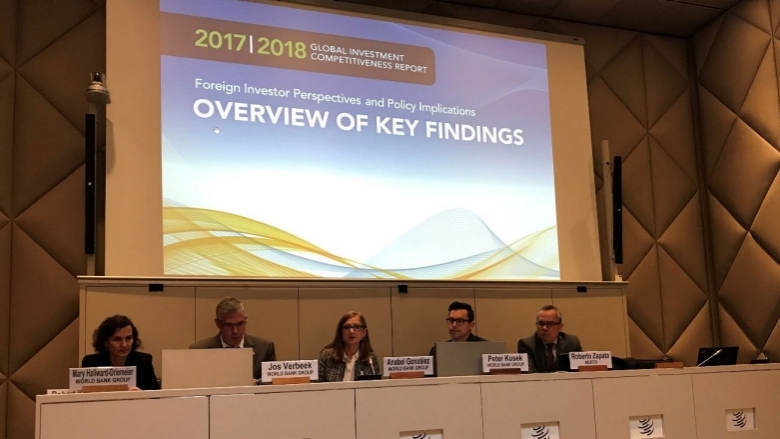On 1 November 2017, the World Bank launched two reports at the World Trade Organization in Geneva, with two interactive panels with experts who discussed the main findings and highlights of the reports. The first panel focused on the report “Trouble in the Making? The Future of Manufacturing-Led Development”. Panelists included Richard Baldwin, Professor of International Economics at the Graduate Institute in Geneva, Robert Koopman, Chief Economist and Director of Economic Research and Statistics Division at the WTO and Mary Hallward-Driemeier, Senior Economic Advisor with the World Bank Group’s Trade & Competitiveness Global Practice and lead author of the report.
Panelists reflected on how new technology, including advanced robotics, industrial automation, and 3-D printing, are changing the landscape of global manufacturing. The report highlights that developing countries’ traditional path to development, often driven by manufacturing, may be at risk because the criteria for becoming an attractive production location are changing. Although there are challenges, opportunities remain for developing countries, as long as governments take appropriate policy actions on the 3Cs: competitiveness, capabilities, and connectedness.
The launch of the Global Investment Competitiveness Report 2017/2018 followed with opening remarks by Anabel Gonzalez, Senior Director of Global Trade and Competitiveness at the World Bank, a presentation by the lead authors Mary Hallward-Driemier and Peter Kusek, and closing comments from Ambassador Roberto Zapato, Permanent Representative of Mexico. The panel was chaired by Jos Verbeek, World Bank’s Special Representative to the UN and WTO in Geneva.
The Global Investment Competitiveness Report 2017/2018 combines a survey of 750 multinational investors and corporate executives with detailed analysis and recommendations concerning FDI in developing countries. The report considers developing countries as both sources and recipients of FDI. The analysis examines the ability of developing countries not only to attract private investment but to retain and leverage it for inclusive and sustainable growth.

